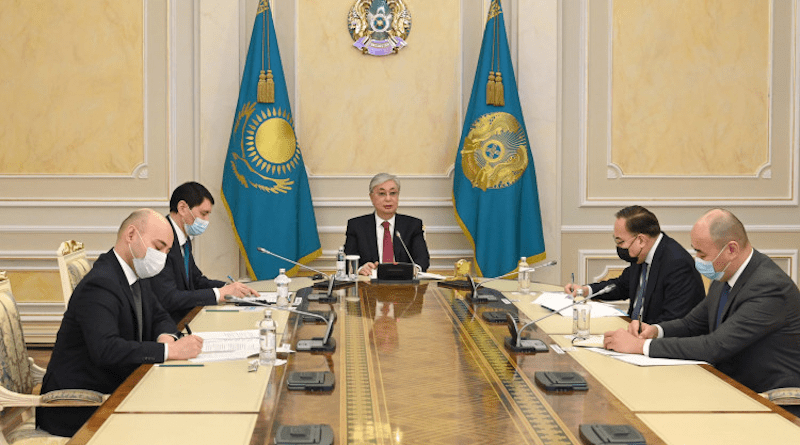Kazakh Expert: It Would Be Worthwhile For People Loyal To Tokayev To Not Too Closely Bind Themselves To Disastrous Course – OpEd
On 19 March 2019, Nursultan Nazarbayev who had ruled Kazakhstan for 30 years announced his resignation, stating that Senate Chair Kassym-Jomart Tokayev would take over as President. The latter has been in power for almost five years in Kazakhstan and, as required by the official results of the 2022 presidential elections, is supposed to stay there for another five years. He subsequently cannot run for the presidency once again, unless, of course, the constitution is one more time amended concerning presidential term limits. The latter is a usual thing for post-Soviet Kazakhstan’s political practice. But anyway, the first five-year period of Tokayev’s stay in power is about to expire.
The time has come, therefore, to bring intermediate results of the Board Kassym-Jomart Tokayev. So, how has Kazakhstan changed in 5 years of Tokayev’s presidency, now being associated with the slogan “Together we will make New Kazakhstan a reality”? Let’s wonder how the responses to this question look when viewed from Kazakhstan and the West.
Here, for example, is what Pyotr Svoik, who has experience as a high-ranking Kazakh official, and as a member of the country’s Parliament, said to a journalist when he shared his opinion about “what awaits the New Kazakhstan program, and why that idea is doomed to failure”: “But there is no New Kazakhstan, other than a set of presidential election promises and slogans in annual messages to the people. These presidential promises and slogans are all the more important for us given that although the President has so far done almost nothing to give a start to their implementation, he was and still is uttering them probably not to eventually nullify both his goal-setting and himself together with it”.
According to Pyotr Svoik, “the current [Kazakh] government is a government of budget cuts, tax increases, and [communal] tariff doublings”. And this [course of the Kazakh government], he suggests, “will in an evident way lead the socio-economic situation [in the country] to a gridlock”.
He also takes the view that “it would be worthwhile for people loyal to the Kazakh President [Tokayev] to not too closely bind themselves to the disastrous course [which is carried out now in Kazakhstan]”.
Now let’s see how the situation which has developed in Kazakhstan in the last 5 years is seen from the West. Luca Anceschi, a professor in the School of Social and Political sciences at the University of Glasgow, in an article entitled “The Old Politics of New Kazakhstan: Despite two era-defining moments occurring in the five years since Nazarbayev’s resignation, continuity is the main feature of governance in Kazakhstan”, said the following on the matter: “Fast forward five years to early 2024 and we find eerily similarly dynamics at play in Kazakhstan’s halls of power. On February 6, 2024, Kassym-Jomart Tokayev, Nazarbayev’s handpicked successor, reshuffled the government, instructing incoming Prime Minister Olzhas Bektenov to quickly develop a comprehensive agenda to relaunch the Kazakhstani economy, which, well into the mid-2020s, remains in a state of stagnation.
In 2024, five years on from the resignation of his first president and two years after one of the most dramatic weeks experienced by the country since independence, Kazakhstan is still led by an elderly man who heads an authoritarian, kleptocratic regime and presides over a struggling economy.
Some things, it seems, never change”.
Alas, the situation in Kazakhstan, as the above suggests, remains complicated, and the forecasts are discouraging. During Kassym-Jomart Tokayev’s five years in power, almost nothing in the country has changed. The only thing that can be noted as a change is that prices have become too high and they keep increasing in the country. In 2022, Kazakhstan was experiencing higher inflation than most other CIS countries, except Ukraine on the territory of which, there was war, that is continuing today. In May of 2023, the Central Asian nation had already overtaken Ukraine on this indicator – 15.9% vs. 15.3%.
The Kazakh citizens are now hearing that the inflation rate in annual terms was reduced to 9,8% in 2023, due to the measures undertaken by the Kazakh government and central bank. But such assertions raise doubts even among the leading Kazakhstani political experts. Here is how Dossym Satpayev, a well-known Kazakh political analyst, sees the situation in Kazakhstan related to those two important economic indicators, inflation, and GDP: “They [the authorities] are again creating the appearance of favorable changes and lying to us. On GDP growth, on reducing inflation. As recently as in January, [the then Kazakh prime minister] Alikhan Smailov met with the President and told him that we had halved inflation. This is although food prices continue to rise. They tell us that the level of poverty is 5%. This is although the World Bank stated back in 2022 that the level of poverty in Kazakhstan had already then reached 16%. In other words, statistics are still held up as a kind of distorting mirror. But if you get distorted data, and you lie to [even] yourself, then what kind of economic program can you develop?”.
Comments are, as we say, unnecessary.

